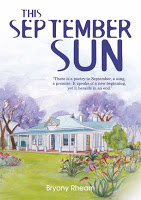
I realised a couple of years ago that your average American and I were very different, in that a 30 year old American has seen versions of themselves and their lives in books, and in films and TV, thousands of times. In fact, they rarely see anything that isn’t about some version of their life. Whereas, for a Zimbabwean, I can probably count on one hand the number of times I’ve seen me or someone like me represented in the arts, or in media. In fact, as a Zimbabwean in the diaspora, I can’t think when I’ve ever seen me. Until I read THIS SEPTEMBER SUN.
Ms Rheam was born in 1974, and thus this is, thankfully, not another how-we-survived-the-war white person story, because like me she doesn’t really remember the war. This book is about life in Zimbabwe since Independence, and then about life in the diaspora – London to be exact – with a classic what-am-I-doing-with-my-life story line, that I am familiar with not from fiction but from the actual diasporic Zimbabweans I know.
Basically, the book tells the story of a young girl, Ellie, who is very close to her grandmother. She leaves Zimbabwe to got to university in the UK, and her gran dies. She comes back and gets involved in reading her gran’s letters and diaries, and the second half of the book is largely flashbacks to her grandmother’s early life, when she moved to Zim from the UK and had a tortured romance. It ends in the present, with the young woman getting married and moving from London to Mocambique.
The book is in general very well observed. At one point, for example, Ellie rejoices in sleeping in a Zimbabwean bed, noticing particularly how the sheets smell of sunlight, from being dried outdoors. Occasionally there did seem to be a little too much tolerance of the sentimental cliche; she closes one chapter by saying something along the lines of how she loved her daughter, but just didn’t know how to show it. Oh dear.
I went to a talk with the author, who seemed a very nice woman. She said that she is struggling to get her book published outside Zim, and she thinks it is because no one wants personal stories, or romances, from Zim – they only want political tales, and the obviously topical. There was a Shona man there who lectures I think at a University in Zim, and he said he had never really read any white Zimbabwean literature before, and how he felt it ought to be on the syllabus, as minority work. It was very sweet, because he was explaining to us what he learnt from the book about the white community; that it’s a very small one, and that people are constantly leaving it.
